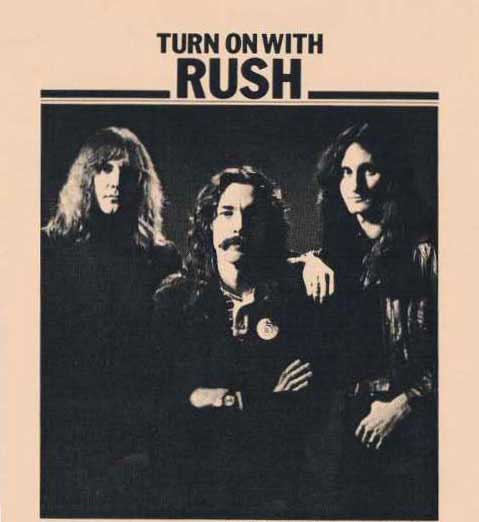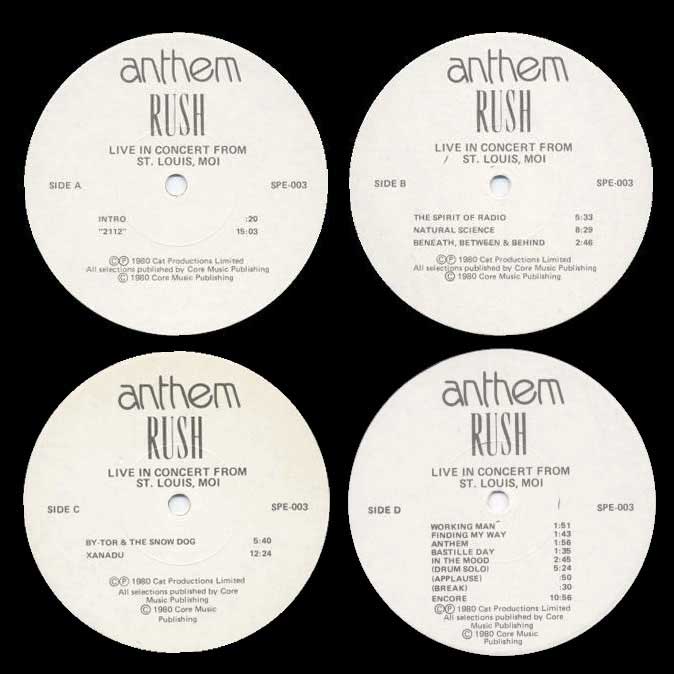Turn On With Rush
NBC Network's The Source, March 28, 1980

RUSH, coming of age in the 80's. Everything they're known for and more, personified in this exclusive concert recorded live for The Source.
Alex Lifeson on guitar, Neil Peart on drums and Geddy Lee on bass and vocals. Together they create music of epic proportions which is laced with their own personal style and unforgettable force.
Recorded by EDR-Media in front of 30,000 people on three consecutive nights, this exclusive concert captures the energy and style of RUSH with songs like "Spirit of Radio," "Closer To The Heart," and "2112." Plus more from their new album "Permanent Waves" on Phonogram/Mercury Records.
Break into the 80's with a Rush.
The weekend of March 28. On more than 200 radio stations throughout the country. Check your newspapers for specific time and station.
Rush Profile
Crackle with life
Bright antennae bristle
With the energy
Emotional feedback
On a timeless wavelength
Bearing a gift beyond price...
In 1974, there was an album called Rush, and a fresh, youthful threesome from Canada pounding out heavy rock rhythms. Six years and another six discs later, the airwaves are crackling and bristling all over the country with the sound of Permanent Waves, Rush's latest album. As of March 1st, weeks after its release, it is Number Five on the charts, and the single, "Spirit of Radio" is making its own waves.

The first taste of what was to come occurred shortly before the release of Rush' s second album in 1974, Fly By Night, when drummer John Rutsey left the group and Neil Peart arrived. With the full consent of founding members Alex Lifeson (guitar) and Geddy Lee (bass, vocals), Peart soon became chief lyricist, and the music began to take on a less straight-forward, more mystical form. That year, the band received a Juno Award (Canadian Grammy) as The Most Promising New Group of the Year. A third platter, Caress of Steel, saw this development taking further shape, with a whole side being devoted to the tale of the quest for the "Fountain of Lamneth."
But it wasn't until their fourth album in '76 that Rush really defined their role as storytellers of sci-fi. Entitled 2112, an entire side of the album was once again taken up with the musical relating of an epic tale. This time around it was a case of future shock, a society in the 22nd Century living under the "Temples of Syrinx," a race of priests who regarded music as a corrupt force, and the guitar as "a toy that helped destroy the elder race of man." 2112 marked a turning point in Rush's career, and became a top selling album.
In an attempt to acquaint a newly established following with their previous work, Rush next released a double retrospective live album called All The World's A Stage. And later, in 1977, the band again broke new ground in Britain, confining themselves to rural Rockfield Studios in Wales and recording the album A Farewell to Kings. Away from city life, Rush came up with a pastoral yet powerful album, with its traditional "epic track" presented in the form of a space opera, "Cygnus X-1," a story about a spaceship pilot traveling through a black hole in outer space.
And in November, 1977, three of their albums were certified gold on the same day in the U.S.: 2112, All The world's A Stage andA Farewell to Kings. After drawing over one million people on their world tour, the group returned to Canada to receive the Juno Award as Best Group of the Year. At this point, they had six gold and three platinum albums in Canada.
If anyone thought that Rush might have run out of ideas, their next album, Hemispheres, blew a few minds. Again recorded at Rockfield, the LP contains just four tracks. The band called the cut, "La Villa Strangiato," a "musical reconstruction of some of Alex Lifeson's dreams." The song "Hemispheres" brought to an end the story of "Cygnus X-1" - through hard-hitting music and evocative lyrics, it tells the tale of a battle between the gods Apollo and Dionysus, of the intervention of the deity Cygnus and of the balance he eventually achieves.
Permanent Waves, Rush's latest album, reflects a new phase in their development - their first non-concept album in nearly five years. The rock fairy tales are gone, but the beat is as strong. They are creating songs of a more personal, philosophical nature. From the "glittering prizes and endless compromises" of "Spirit of Radio" to the emotional realization of "Entre Nous," the theme of personal choice and integrity runs through Peart's lyrics, perhaps best illustrated in "Free Will."
In some celestial voice
If you choose not to decide
You still have made a choice.
You can choose from phantom fears
And kindness that can kill
I will choose a path that's clear
I will choose free will.